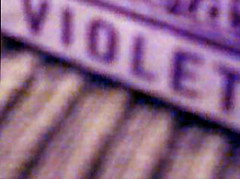I'm at a wedding this weekend. It's a wonderful wedding of two friends who are a great couple. I very much believe in this particular couple and in their future success in marriage. I believe that they are well-suited to each other and each sufficiently independent that they will continue to be individuals and that their marriage will be even stronger than the sum of its parts. I believe that they won't meld into a single entity or lose their connections to their unmarried friends. This is the best marriage I can imagine, and I am truly happy that this event is occuring. It's a beautiful event and I'm proud to be a part of it, and I honestly believe that only the best possible future is in store for the bride and groom together. I have never been less ambivalent about the couple whose wedding I am attending.
And yet, I am conflicted about witnessing this wedding, or any wedding. Because, you see, I'm not sure I believe in marriage. I'm fairly convinced by feminist critiques of marriage as a patriarchal institution that merely reaffirms the power of the state, based on traditions of bartering brides to cement the wealth and power of fathers and husbands. I'm somewhat seduced by radical queer critiques of monogamy that challenge the possibility of remaining faithful to one partner for the rest of your life. At best, I see marriage as a romantic, beautifully optimistic promise of unchanging love and sometimes I wonder if I may someday feel compelled toward the institution of marriage myself. But at the moment, I remain critical of the valorization of the (heterosexual) couple over those who are outside the institution of marriage, and especially over those who are excluded from it.
My friends who are getting married are doing their best to recognize that marriage is very much an unequal institution at the moment, and they are even gesturing in their ceremony toward those for whom official marriage is an impossiblity. The ceremony will include a reading from Goodridge vs. Dept. of Public Health in Massachusetts, affirming that
Marriage is a vital social institution. The exclusive commitment of two individuals to each other nurtures love and mutual support; it brings stability to our society. For those who choose to marry, and for their children, marriage provides an abundance of legal, financial, and social benefits. In return it imposes weighty legal, financial, and social obligations.While the gesture of including this text and its political context in their ceremony is beautiful and so inclusive, the language itself is inherently conservative, affirming the state's involvement in the personal and social relations between two individuals and the state's right to priviledge couples over individuals. Why should the government offer tax breaks and other incentives to heterosexuals who choose to get married and exclude from those favors those of us who are queer or single or nonmanogamous?
At this particular moment, when asked to witness a wedding whose participants I truly love and value while I question the institutions they are reaffirming, I am reminded of the introduction from Eve Sedgwick and Andrew Parker's book, Performativity and Performance, in which they question "the dynamic of compusory witness that the marriage ceremony evokes" (10).
It is the constitution of a community of witness that makes the marriage' the silence of witness (we don't speak now, we forever hold our peace) that permits it; the bare, negative, potent but undiscretionary speech act of our physical presence -- maybe even especially the presence of those people whom the instituion of marriage defines itself by excluding--that ratifies and recruits the legitimacy of its privilege (Parker and Sedgwick 10)
I am very much a part of this community of witnesses, being asked to affirm the value not only of this couple, but of the community of friends and family constituted around them and even more of the institution of marriage into which they are entering. While it is only the last that is difficult for me, it is still strange to be asked to silently affirm by my presence an instution which I question and from which I am excluded. Would I want my friends to abstain from marriage until it were an equal instituion? Would the equality of marriage to all sexes and genders diffuse my political objections? Would I ever get married if given the opportunity? Am I even in favor of gay marriage? These are questions to which I don't really have the answers. But at this moment of witnessing, in which I celebrate two friends for whom I have the utmost respect and great faith in their success as a couple in marriage, I find that I must once again ask myself these questions, if just to keep the dialogue open in my own mind. So I will attend, and cheer and cry and celebrate in honor of two individuals that I love, while maintaining my skepticism and reservations about this long-ingrained practice of state codification of their union.

0 comments:
Post a Comment